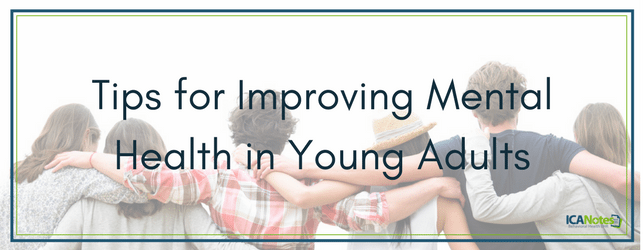Tips for Improving Mental Health in Young Adults
With the particular stresses that can overpower the lives of teens and young adults, it’s no wonder that mental health issues are prevalent among these groups. Roughly one in five in this age range suffers from some kind of mental health condition, with half of them developing problems by age 14.
For those young adults facing some kind of mental health issue, it’s imperative that it is acknowledged. Friends, family members and educators need to be cognizant of changes in behavior that could be indicative of a problem and be supportive in exploring treatment. Some common signs of mental health problems to watch for are:
- Loss of self-esteem
- Drop in academic performance
- Eating disorders
- Self-harm
- Changes in sleeping habits
- Withdrawal/isolation
- Loss of interest in hobbies or activities
Teens and younger adults can make immediate changes in their lives, sometimes with the help and urging of those around them, to counter problems that trigger these symptoms. Here are some ways they can work on improving mental health and help create a more positive outlook during a formative time in their life.
Build Self-Esteem
Approximately 75% of young adults experience issues with self-esteem. They are especially vulnerable to doubt and depression over identity, as theirs are still in a formative stage. To fight these concerns, the following can help play a role in building self-esteem:
- Understand the underlying reasons for negativity. Teens and young adults should examine why they let themselves focus on negative elements of their life. They should be challenged to recognize this and to think about what triggers led them to this behavior. Too often, these triggers are either greatly exaggerated or are false. It’s essential to analyze them individually and explore their validity. Some therapists encourage teens and young adults to write negative elements down so they can be more easily recognized and countered.
- Write down positive traits. It’s also recommended that teens write down what positive traits they recognize in themselves. What do they like most about themselves? What are they most proud of? What was the last thing they accomplished that made them feel good about themselves?
- Engage with supportive and encouraging people. For anyone, it helps to be surrounded by people who are encouraging and supportive — and this positivity can do wonders especially for a teen’s self-esteem. Those who provide encouragement, inspiration or simple kindness can help to chase away times when a teen might question their self-worth.
Fight Depression
Encouraging teens and young adults to be proactive in fighting depression can be especially difficult, as their depression can significantly reduce any motivation to address it. These tips can help play a role in motivating them to move beyond these feelings and be able to better regulate their mood.
A simple way to fight back is through proper diet, exercise and sleep. Nutritional imbalances can further depression, so introducing healthy options for meals is important. Regular exercise can also be beneficial as it triggers the release of endorphins, a chemical in the brain that lifts their mood. Additionally, group exercise, such as team sports, can provide a sense of belonging that helps to fight depression. Poor sleep habits don’t let the brain experience essential recovery periods, which can contribute to poor moods and feelings of hopelessness.
Depression can lead to isolation, so it’s vital for teens to have people around them who are truly listening and compassionate. Make time to spend with them, talk with them and listen without judgment. Don’t present yourself as someone with all the answers — they often just need to be able to communicate their feelings. Just make sure they feel that there are people in their lives who are there for them.
Get Help When Appropriate
Often times, symptoms may not respond to interventions like these, and professional help will be required. Encourage teens and young adults to speak with a counselor or therapist who can properly evaluate their mental health and provide effective ways to overcome behavioral issues. Let them know in no uncertain terms that there is no stigma attached to professional therapy, and consistently praise every change you recognize in their behavior.
A Note on Suicidal Thoughts
Suicide in teens and young adults is all too prevalent, and related thoughts should never be discounted. If any talk of suicide comes up, it’s important to get help quickly. A family doctor can help, and emergency room visits are even recommended for severe cases. If they need to talk to someone right now, here are some important numbers to know:

